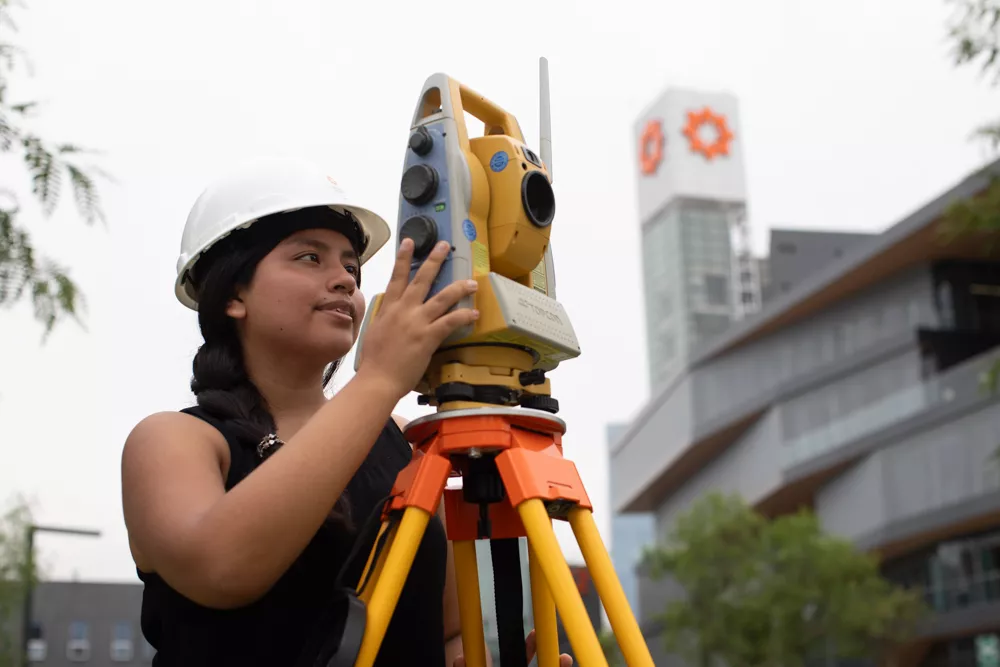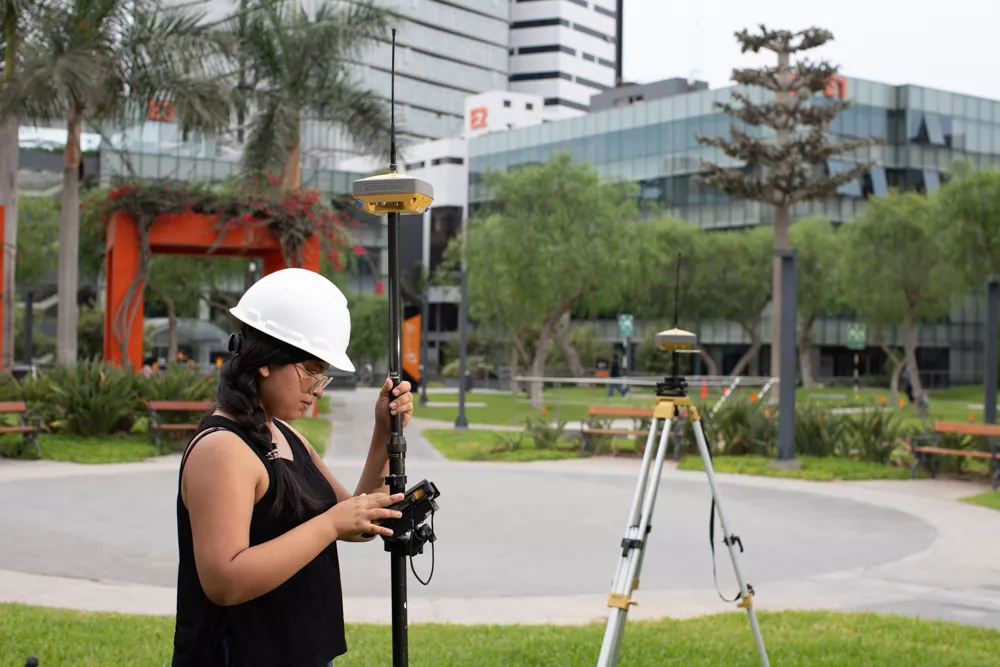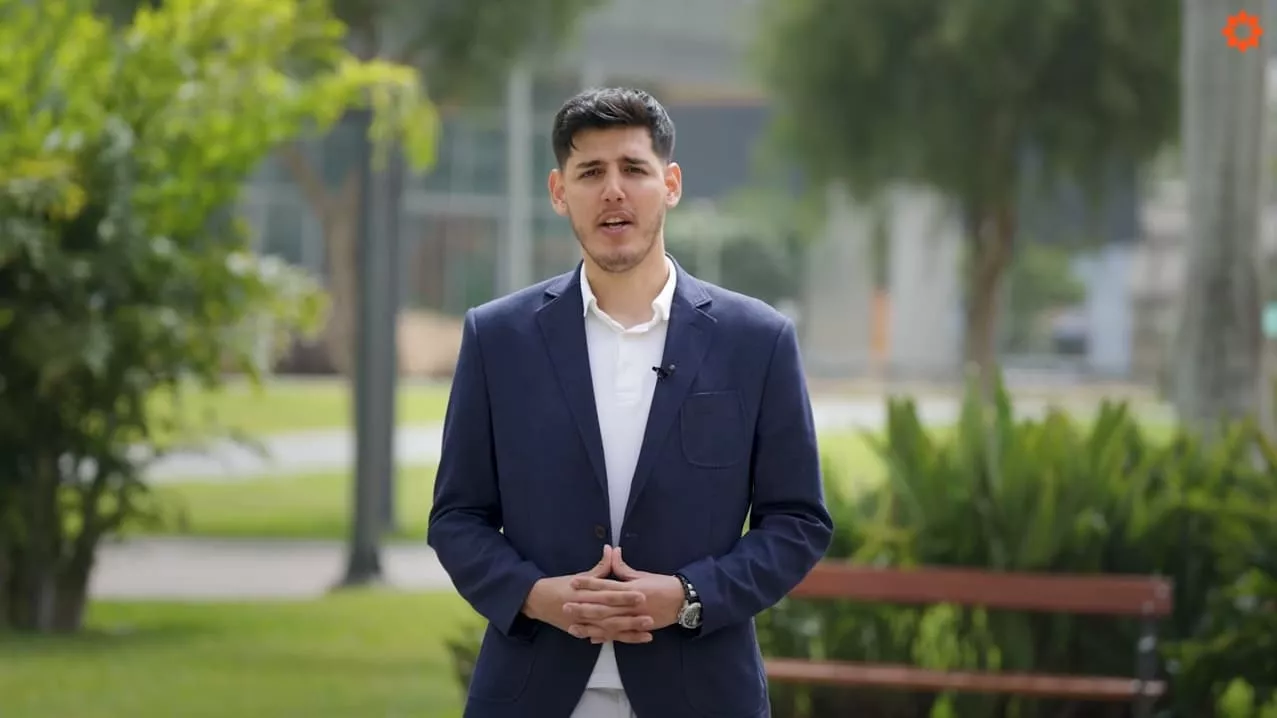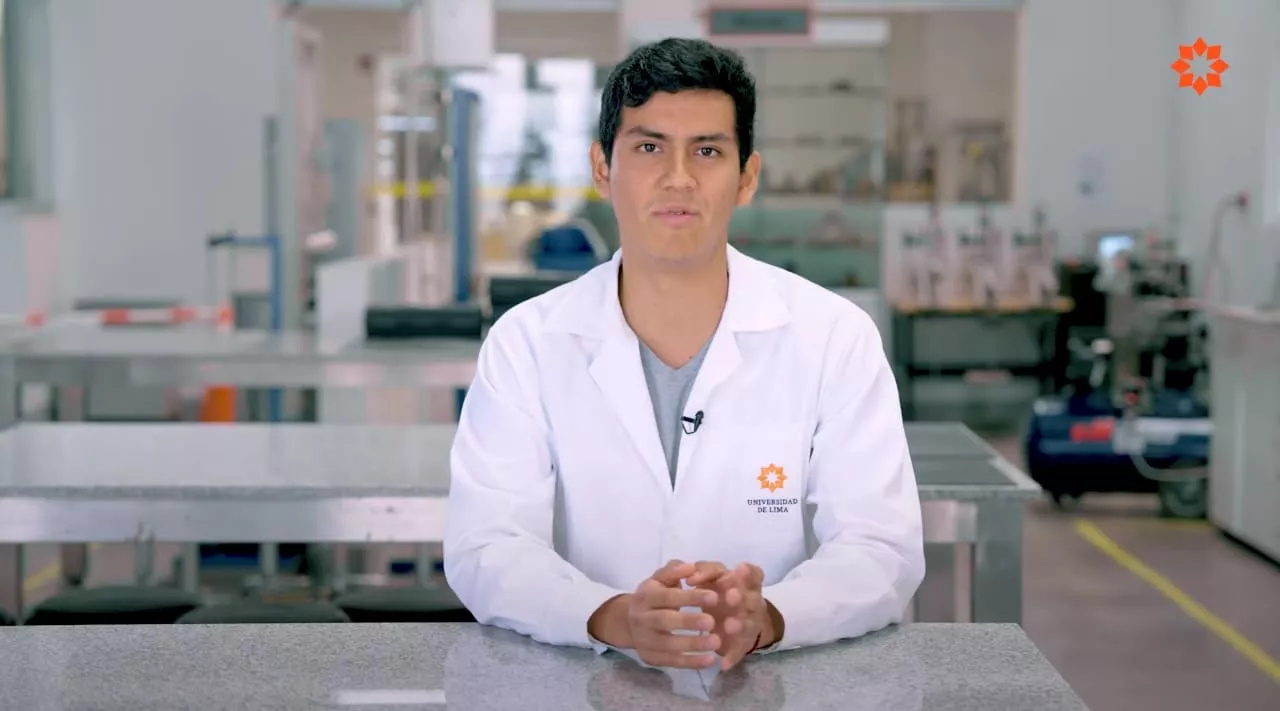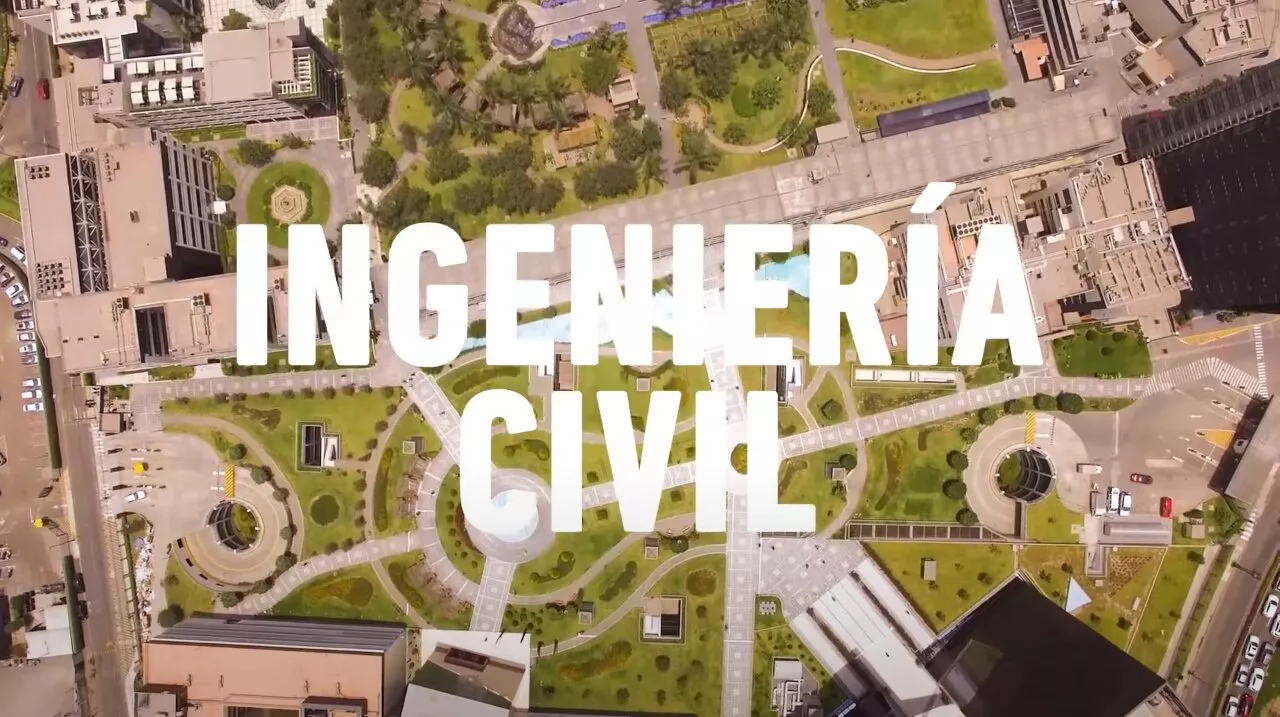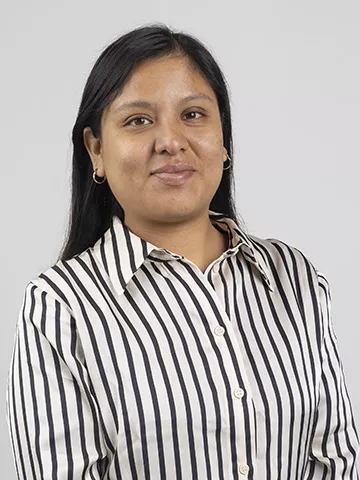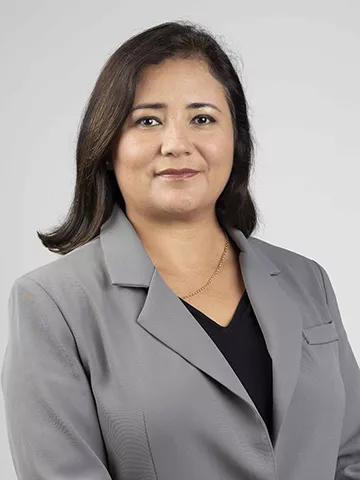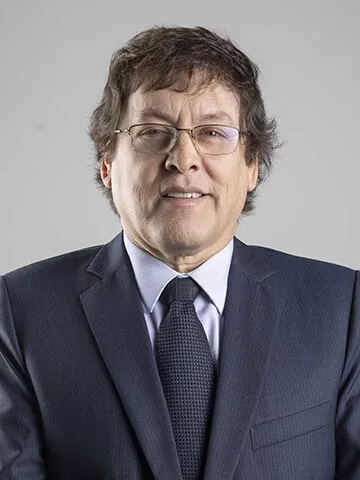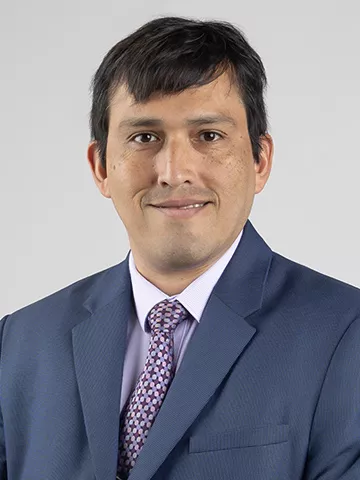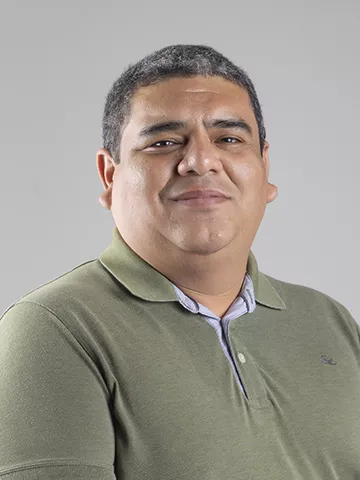Civil Engineering
ABOUT
The Civil Engineering Undergraduate Program strengthens the construction industry and offers students a solid training in design and construction with great technical soundness. Moreover, students will learn to lead task forces, manage processes and costs, and develop eco-friendly projects that offer creative and innovative responses to the global construction sector.
Graduates from the Civil Engineer Program stand out for their comprehensive approach and innovative capacity to solve problems in the construction sector. With a solid background in science, engineering, research and management—combined with a collaborative and multidisciplinary perspective—they leverage Information and Communication Technologies (ICT) to manage infrastructure projects in an efficient and sustainable manner throughout the entire asset life cycle.
Their commitment to excellence is reflected in the ability to consider technical, global and social aspects in the design and implementation of projects, ensuring a positive impact on the community.
Mission
We train leading civil engineers capable of designing, building and managing sustainable infrastructures that promote economic development, technological advancement, and the integral well-being of society.
Vision
To be a reference in Latin America for training civil engineers recognized for their leadership, sustainable approach, technological innovation, and positive impact on economic and social development.
The Program Educational Objectives (PEO) outline the key milestones every civil engineering professional must achieve, based on insights from employers, alumni, faculty, and students.
A graduate from Universidad de Lima in Civil Engineering achieves the following:
- PEO 1: Mastering technical skills for planning, analyzing, designing, constructing, supervising, operating, and maintaining infrastructures.
- PEO 2: Excelling in project management, teamwork, and leveraging ICT to provide valid, creative, innovative, and sustainable technical solutions for the efficient management of infrastructure projects.
- PEO 3: Leading with confidence and communicating effectively within multidisciplinary teams during all phases of infrastructure project management.
- PEO 4: Committing to lifelong learning and harnessing the latest technologies in infrastructure management.
- PEO 5: Innovating and researching to meet engineering challenges with a focus on continuous improvement.
- PEO 6: Practicing with a strong ethical foundation and social responsibility to drive sustainable development in both organizations and communities.
Student Outcomes (SO) describe the competencies that a Civil Engineering student develops during their academic training. Below are each of the skills:
- SO1: An ability to identify, formulate, and solve complex engineering problems by applying principles of engineering, science, and mathematics.
- SO2: An ability to apply engineering design to produce solutions that meet specified needs with consideration of public health, safety, and welfare, as well as global, cultural, social, environmental, and economic factors.
- SO3: An ability to communicate effectively with a range of audiences.
- SO4: An ability to recognize ethical and professional responsibilities in engineering situations and make informed judgments, which must consider the impact of engineering solutions in global, economic, environmental, and societal contexts.
- SO5: An ability to function effectively on a team whose members together provide leadership, create a collaborative and inclusive environment, establish goals, plan tasks, and meet objectives.
- SO6: An ability to develop and conduct appropriate experimentation, analyze and interpret data, and use engineering judgment to draw conclusions.
- SO7: An ability to acquire and apply new knowledge as needed, using appropriate learning strategies.
CURRICULUM
Flexible curriculum that balances science, technology and humanities. It also includes subjects related to business management, which ensures the education of well-rounded professionals capable of responding to challenges posed by the design, construction, supervision, and maintenance of all types of infrastructure.
ACADEMIC DEGREES AND PROFESSIONAL TITLES
Universidad de Lima grants a Bachelor's degree in Civil Engineering and the professional title of Civil Engineer. You can find the detailed requirements in the following documents:
Requirements to obtain graduate status in the Civil Engineering Undergraduate Program:
Successfully complete 205 credits, with at least 103 credits earned at Universidad de Lima.
Fulfill all obligations and commitments to the University.
Requirements
Hold graduate status in the Civil Engineering Undergraduate Program.
Submit a certificate of pre-professional internship (six cumulative months).
Demonstrate proficiency in a foreign or native language by presenting a certificate from an institution recognized by Universidad de Lima.
Successfully complete a final-level research course, which includes a specialized research project.
Fulfill any additional applicable requirements established by Ulima regulations.
Complete the administrative process to obtain the Bachelor's diploma.
Procedure
Complete the administrative process via Mi Ulima to obtain the Bachelor's diploma. For a full guide, click here.
Requirements
Hold a Bachelor's degree in Civil Engineering.
Successfully complete one of the options to obtain the professional title.
Complete the administrative process to obtain the professional title diploma. For further information, click here.
Complete the administrative process via Mi Ulima to obtain the professional title. For a full guide, click here.
Modality I: Thesis
Submodality A: Submit a publishable research paper developed in the Research Seminar II course.
Submodality B: Develop a thesis on a new topic.
Submodality C: Submit a published or accepted research paper in an indexed journal—preferably Scopus or Web of Science—or in an indexed academic conference.
Modality II: Professional Proficiency Project
The Civil Engineering Undergraduate Program offers four Specialist Certifications:
- Virtual Design and Construction
- Structures
- Collaborative Project Management
- Transportation and Geotechnics
Requirements:
- Hold a Bachelor's degree.
- A weighted average of no less than 13.00 across the required courses.
- Successfully complete all Specialist Certification courses within a maximum of two attempts.
- Complete at least three months of pre-professional internships in the area related to the Specialist Certification or an equivalent activity.
School of Engineering
Civil Engineering Undergraduate Program
Academic Degrees and Professional Titles Office
Building O1, Floor 11
T. 4376767 extension 37115
gytcivil@ulima.edu.pe
SPECIALIST CERTIFICATIONS
- TRANSPORTATION AND GEOTECHNICS
- VIRTUAL DESIGN AND CONSTRUCTION
- STRUCTURES
- PROJECT COLLABORATION MANAGEMENT
TRANSPORTATION AND GEOTECHNICS
This Specialist Certification provides students with the right competences in analysis and design of geotechnical structures, soil-structure interaction, and slope stability. It also teaches about geometric design of highways and use of digital technologies for georeferenced data management. Moreover, it focuses on the assessment and design of road infrastructures with special emphasis on sustainability, efficiency and durability of flooring.

VIRTUAL DESIGN AND CONSTRUCTION
This Specialist Certification provides students with the VDC methodology, which comprises Integrated Concurrent Engineering (ICE), Building Information Modeling (BIM), and Product Production Management (PPM). Through subjects such a Construction Project Management, Operations and Maintenance, Productivity in Sustainable Projects and Infrastructure, students will acquire the right skills to develop performance indicators, streamline processes, and assess the sustainability of infrastructure projects. Upon completion, students will be fully capable of leading construction, operation and maintenance projects with a innovative, sustainable and efficient approach, using advanced technological tools and modern collaborative techniques.

STRUCTURES
This Specialist Certification provides students with specific competences and skills to analyze and design structures of reinforced concrete, steel, and brickwork, which are seismic-resistant during its entire life cycle. Students will master criteria related to the behavior of concrete, structural steel and brickwork, structural modeling, structural analysis, and design of elements subject to different environments. This allows a global knowledge of the structure design process.

PROJECT COLLABORATION MANAGEMENT
This Specialist Certification provides students with competences in integral management of construction, operation, and maintenance projects, while creating control indicators in terms of scope, deadlines, cost and risks. It also builds skills in BIM and VDC methodologies to improve collaboration and performance in projects. Moreover, students apply the Lean Methodology to increase productivity and assess infrastructure sustainability using water and energy efficiency tools, as well as the Life Cycle Assessment (LCA), based on sustainability certifications.

PARTIAL CERTIFICATIONS
- 3D BIM
- 4D BIM
- 5D BIM
Agreements

University of Wuppertal
Founded in 1972, this university trains students following the Humboldtian tradition, offering a multidisciplinary education based on research. Its programs focus primarily on Wuppertal's traditional disciplines, such as engineering, sciences, arts, and design.
CONSORTIUM OF UNIVERSITIES
It is a non-profit civil organization comprising Pontificia Universidad Católica del Perú, Universidad del Pacífico, Universidad Peruana Cayetano Heredia and Universidad de Lima. This partnership allows students from these four institutions to access academic and university services, premises, validated courses, and credit equality for courses taken in any university of this Consortium.
Optional second international bachelor's degree
Universidad de Lima offers students the opportunity to develop in global environments, enhance their networking, and live an international experience through the optional second international bachelor’s degree programs.
- UNITED KINGDOM
University of London
Thanks to the agreement between Universidad de Lima and University of London (UOL), internationally recognized for its high academic standards, students can obtain a second international bachelor’s degree without leaving the country: Bachelor of Science in Business Administration. This program is available to students from all undergraduate programs at Universidad de Lima.
Information: uol@ulima.edu.pe

PUBLICATIONS
The Publishing Fund publishes works that reflect intellectual output and research carried out by Ulima professors. The final goal is to connect with the community through the dissemination of ideas and knowledge from different disciplines. Learn more about our faculty publications.
Find online all academic output from members of the Civil Engineering Undergraduate Program. Click on each item for further information.
- Books and articles from Civil Engineering professors and researchers
- Civil Engineering thesis: professional title
This Spanish version of the book Integrating Project Delivery from Martin Fischer, Howard Ashcraft, Dean Reed and Atul Khanzode is the first book-length discussion of IPD. It combines structure, process, technology, and behavior for high-performance collaborative projects. It is a useful guide for students and professionals from architecture, engineering, construction, and operations to further understand the IPD's value. Moreover, it discusses legal structures that support the process, and features case studies revealing how leading companies use IPD. Alexandre Almeida was in charge of the foreword and Spanish translation coordination.
Directory
ADVISORY COUNCIL
Hugo Scaletti Farina
Scaletti holds a PhD and an MSc in Civil Engineering from the Massachusetts Institute of Technology (MIT) and a Civil Engineering degree from Universidad Nacional de Ingeniería (UNI). His accolades include the Antorcha de Habich (2005) from UNI, the Medal of the Lima Departmental Council (2003) from Colegio de Ingenieros del Perú (Professional Board of Engineers of Peru), and the COSAPI Innovation Award (2002). He is currently a Full Professor in the School of Civil Engineering at Universidad Nacional de Ingeniería.
Leonardo Antonio Rischmoller Delgado
Rischmoller holds a PhD in Engineering Sciences from Pontificia Universidad Católica de Chile, postdoctoral training in VDC at Stanford University, and an Executive MBA from UC Berkeley. He graduated as a Civil Engineer from Universidad Ricardo Palma in Peru. As a Business Analyst at DPR Construction (USA), a board member of COSAPI, and Chair of the Innovation, Technology, and Processes Committee, he is driving the future of engineering and construction.
Luis Miguel Bozzo Rotondo
Bozzo holds a PhD and a MSc in Civil Engineering from UC Berkeley and a Civil Engineering degree from Universidad Nacional de Ingeniería (UNI). He currently leads Luis Bozzo Estructuras y Proyectos in Barcelona, Spain.
WORK REPOSITORY
Compilation of the most outstanding works from our students. This repository's goal is to boost the research spirit and disseminate contributions produced by Ulima community members.
Professors
Our professors not only excel for their academic and professional track record, but also for their vocation of teaching and promotion of ethical and critical education. Through their work, Ulima professors foster the development of knowledge, research, and social commitment to train leaders with positive impacts on society.
BIM-VDC CULTURE
- INTRODUCTION
- BUILDING INFORMATION MODELING (BIM)
- VIRTUAL DESIGN AND CONSTRUCTION (VDC)
- STANFORD CIFE ALLIANCE
- NATIONAL QUALITY INSTITUTE (INACAL)
- MINISTRY OF HOUSING, CONSTRUCTION AND SANITATION
INTRODUCTION
The Civil Engineering Undergraduate Program of Universidad de Lima has the differential factor called BIM-VDC. The BIM-VDC culture is not limited solely to the implementation of such methodology throughout the curriculum. Universidad de Lima, through the Civil Engineering Undergraduate Program, is also a member of a number of national and international organizations and institutions with a significant impact on Peruvian society.
BUILDING INFORMATION MODELING (BIM)
BIM proposes the interrelation of construction process, work planning, material logistics, costs, budgets, management, value engineering and building life by using three-dimensional digital models that work with data. Therefore, a BIM model includes not only graphic representation but also technical characteristics: interferences, quantity take-offs, budgets, surfaces, three-dimensional views, and energetic or structural analysis and calculation.
The subjects of the Civil Engineering Undergraduate Program must have a relationship between them so that students may find a connection between contents. One of the main problems of current curricula is that the facilities to integrate knowledge to solve the engineering problems that may arise in professional life are not provided to students, who show lack of abstract reasoning and limited 3D problem-solving skills.
In this regard, the Civil Engineering Undergraduate Program of Universidad de Lima proposes that the subjects should be related to the requirements of national companies. To this end, the areas of study have been divided into different fields of action: Construction and Architecture, Structures and Management, which are the areas that are more associated with the handling of building information. In order to facilitate this process, recourse is made to information systems called BIM and cutting-edge tools that enable linkage of theoretical content with reality.
Thanks to the integration of this methodology into the curriculum, civil engineering students of Universidad de Lima may obtain partial certifications related to each of the dimensions of the BIM as they advance in their studies:
- 3D BIM: Creation of three-dimensional architectural and structural models with information.
- 4D BIM: Addition of the time parameter for the virtual construction of the three-dimensional architectural and structural project.
- 5D BIM: Addition of the costs of the elements that make up the virtual model.
- Peruvian architects living in Canada talked about the BIM methodology in a webinar (October 10, 2017)
- An expert gave a talk on BIM methodology (March 13, 2018)
- Civil Engineering Undergraduate Program: leader in the dissemination of the BIM model (July 11, 2018)
- Alexandre Almeida wrote an article on BIM benefits which was published in the journal of the Engineers Association (October 10, 2018)
- Director Alexandre Almeida participated in a BIM technology event (November 30, 2018)
- Director Almeida highlighted the BIM in Peru in his newspaper column in RPP (April 12, 2019)
VIRTUAL DESIGN AND CONSTRUCTION (VDC)
Virtual design and construction (VDC) methodology consists of a modern integration of design, construction and operation from the early phases of a project, for which it is based on BIM models. The purpose of this methodology is to define, align and reach goals, as well as contribute to the reduction of unnecessary resources (time, capacity, inventories, costs) throughout the entire development process.
- Engineering modeling methods: product, organization and process.
- Model-based analysis and design methods: quantity take-offs, schedules, costs, process risks (BIM tools).
- Information visualization methods.
- Business metrics and strategic management approach.
- Economic impact analysis: models of the cost and value of capital investments.
In addition to the fundamental tool called BIM, VDC is based on project production management (PPM). The detailed monitoring of the virtual information and metrics generated from both (BIM and PPM) converges in the decisions taken in the sessions called integrated concurrent engineering (ICE), the great catalyst of this methodology.
This methodology brings a series of benefits for the entire construction process, both in virtual and physical format. First, it significantly improves collaborative work between the different agents involved in the project; secondly, and as a result of the first point, it reduces time and costs, if any unexpected event occurs, by reducing incompatibilities in the design and providing more detailed information for making decisions.
- Universidad de Lima gave a talk on VDC program (December 4, 2018)
- Perú Construye and Construir highlighted the launch of the VDC program in Universidad de Lima (December 19, 2018)
- Stakeholders journal highlighted the third edition of the VDC program (January 25, 2019)
- Director Alexandre Almeida talked to CIP TV about the VDC program (February 8, 2019)
- Ulima gave a talk on collaborative management and VDC (February 19, 2019)
- A VDC program expert gave a virtual conference for Ulima (February 21, 2019)
- VDC program advisor wrote an article for Constructivo journal (March 1, 2019)
- Canada-Peru Chamber of Commerce announced the launch of the VDC program (March 5, 2019)
- The Civil Engineering Undergraduate Program started the International Workshop as part of the third edition of the VDC Program (March 6, 2019)
- The International Workshop of the third edition of the VDC Program came to a successful end (March 13, 2019)
- The third edition of the VDC Program in Peru was inaugurated (March 18, 2019)
STANFORD CIFE ALLIANCE
The Stanford University’s Center for Integrated Facility Engineering (CIFE) is the main research center in the world for virtual design and construction of projects related to the field of architecture, engineering and construction. In the same vein, the virtual design and construction (VDC) methodology was developed by this prestigious center, which intends to develop, learn and apply the VDC principles and methods with a view to helping projects provide an exceptional value, and helping member organizations achieve innovative objectives in their projects in terms of design, construction and administration.
As a result of the Third Virtual Design & Construction Program, and in the context of the BIM culture of the Civil Engineering Undergraduate Program, Universidad de Lima has an alliance with the CIFE. This has led the University to become the only institution of Latin America that is a member of this prestigious organization, together with companies and academic institutions leaders in the use and application of this technology, such as AutoDesk, Google, Project Production Institute, Hilti, among others.
This alliance is essential for Universidad de Lima given that it represents two opportunities: research and education. As for research, the CIFE works with member companies in order to document problems, and develop and test new innovative ways enabling to model, visualize, analyze and evaluate the multidisciplinary performance of design and construction projects, and validate results. As for education, the idea is to increase knowledge and competence to use methods, and understand the VDC value and costs that represent for professionals and students.
How is all this achieved? Through academic exchange agreements of students, professors and researchers with the University of Stanford, the access to projects implemented by the CIFE itself under the VDC methodology, and the opportunity to offer a VDC program aimed at training the professionals in the construction industry by using new technological tools.
INACAL
Universidad de Lima, through the Civil Engineering Undergraduate Program, is a member of various committees of the National Quality Institute (INACAL), attached to the Ministry of Production, together with other representatives of the public sector, private sector and academia. Universidad de Lima is part of the Technical Committee for Standardization (CTN) of Buildings and Civil Engineering Works, and the Technical Subcommittee for Standardization (SCTN) of the Organization of Information on Construction and Quality Works in Construction.
The purpose of these committees is to develop Peruvian Technical Standards (NTP) that standardize quality and ensure safety in constructions with a view to preventing accidents during earthquakes or disasters. Their work is to propose standards according to the guidelines and good practices necessary to ensure quality in constructions. To this end, technical, environmental, social, economic, innovation, and occupational safety and health aspects are considered.
As for the ongoing work, Alexandre Almeida, MEng, Director of the Civil Engineering Undergraduate Program, and Technical Secretary of the CTN and SCTN, comments as follows:
“It is very important to have quality buildings that mainly guarantee us safety. Along with the organizations that make up the technical committee and subcommittee, we are committed to developing Peruvian Technical Standards that allow us the construction of safe houses, from design, planning and process to manufacturing and materials to be used in the construction.”
MINISTRY OF HOUSING, CONSTRUCTION AND SANITATION
Universidad de Lima, through the Civil Engineering Undergraduate Program, is a member of the BIM Committee of the Construction Bureau of the Ministry of Housing, Construction and Sanitation (MVCS) thanks to the innovative and technical proposal to implement the BIM methodology in the curriculum in a holistic manner. This group is also made up of specialists from the Office of the Comptroller General of the Republic of Peru; professionals from the housing, internal affairs, transportation, economy and education sectors; and representatives from private business and other universities.
The objective of the BIM Committee is to prepare the guidelines of a new national technical standard for the development of projects with the use of BIM methodology. Therefore, this Technical Committee for Standardization aims at homogenizing the technical characteristics that a model of this type should contain as a minimum. The standard, called BIM Model, will allow the application of the methodology used globally for collaborative works in construction projects. This standard is addressed to public sector entities, so that they may integrate the technical guidelines of the BIM methodology into their procurement process. Thus, it is intended to optimize resource management, and save time and costs of a construction.
It is worth mentioning that, in Peru, the BIM model was incorporated in 2010, and it was therefore necessary to standardize the minimum technical guidelines with a view to optimizing project management, and promoting collaborative work.
STUDY CIRCLES
Building Information Modeling Study Circle
The Building Information Modeling Study Circle (CEBIM) of Universidad de Lima is made up of students from different undergraduate programs of the University with a common interest in research new technologies and methodologies for the planning, design, execution and maintenance of buildings and infrastructure projects in the construction field.
Mission
Encourage academic development through the study of BIM and its different applications to engineering projects.
Vision
Be the benchmark BIM study circle in the national and international spheres.
Values
CEBIM fosters an ideal environment for the professional development of each of its members, which is supported by the following values:
- Honesty
- Responsibility
- Integrity
- Excellence
- Collaboration
- Independence
- Perseverance
- Overcoming
- Service
- Respect
Professor in charge
Ana Luna
aluna@ulima.edu.pe
Students in charge
Lisel Astril Pazce Ayala
20234989@aloe.ulima.edu.pe
Ana Paula de la Cruz Huamán
20202831@aloe.ulima.edu.pe
Activities
INTERNATIONAL VDC CONGRESS
This international space promotes the exchange of academic and professional experiences regarding the implementation of VDC methodology, in order to improve efficiency in the construction industry.
Information
vdc@ulima.edu.pe
Website

RESEARCH EXPO
Following the institutional policies, the Civil Engineering Undergraduate Program promotes a research culture through different activities that encourage students and professors to get involved in topics that contribute towards solving engineering challenges posed by the modern world. In this regard, the Research Expo calls authors of the most outstanding papers from this undergraduate program in order to make them more visible and foster strategic applications in benefit of the progress of society.

ENGINEERING WEDNESDAYS
Engineering Wednesdays comprise regular activities that focus on different specializations and areas of interest within this specific discipline. It fosters professional updating and exchange of knowledge between students, professors, and experts of the industry. Furthermore, it is a space for debate, project presentation, and specialized workshops that contribute to the comprehensive development of future engineers.

INTERNATIONAL VDC PROGRAM
The Stanford University’s Center for Integrated Facility Engineering (CIFE) has developed the VDC program, in order to design and implement projects through a virtual platform. As a result, the traditional project management challenges can be resolved before the construction phase. The Civil Engineering Undergraduate Program at Universidad de Lima develops the Virtual Design & Construction Program (VDC) Certification by the Stanford Center for Professional Development. This program is carried out in Spanish and it is 100% practical and unique in Latin America.

Lifelong Learning
Keep your competences, skills and knowledge updated throughout your entire professional life.
- GRADUATE STUDIES
- EXECUTIVE EDUCATION
- STUDY ABROAD
- LANGUAGES
GRADUATE STUDIES
Our master's and doctoral programs focus on training interdisciplinary professionals who promote innovation, entrepreneurships and research.
EXECUTIVE EDUCATION
The Executive Education Bureau (DEC) at Universidad de Lima offers workshops, courses, and specialization programs to train executives, professionals, and businesspeople in specific management areas.
STUDY ABROAD
If you wish to study abroad, this is the right place to find all relevant information about scholarships and academic opportunities.
LANGUAGES
Ulima Language Center provides students with the right tools and knowledge to communicate in English in different situations. Below you can find some of our programs:
LABORATORIES
- Environmental Engineering Laboratory
- Geotechnical Laboratory
- Hydraulics Laboratory
- Materials Laboratory
- Pavement Laboratory
- Project Simulation Laboratory
- Structures Laboratory
- Topography and Geomatics Laboratory
Environmental Engineering Laboratory
This laboratory is a specialized center that meets the training requirements of engineering students (civil, industrial, and environmental) as well as the demands of researchers who are linked to engineering and sustainability projects.
Civil Engineering and the environment are closely related due to the wide range of actions lines of professionals in this area. Thus, the commitment of civil engineers with the environment is a must.
Our laboratory provides technical support in key areas such as renewables, advanced material characterization, and physicochemical analysis.
Tests
We have state-of-the-art equipment to carry out different tests—both at academic level and applied research.
Water
- Determination of heavy metals
- Analysis of physicochemical parameters for water quality
- Determination of inorganic matter
- Molecular characterization of pollutants
- Corrosion tests in saline water
Soil
- Quantification of heavy metals at trace levels
- Analysis of soil moisture
- Characterization of chemical compounds in soil
Air
- Nitrogen gas absorption study
- Environmental noise level study
Renewable energies
- Tests on photovoltaic solar energy (panels)
Tests on solar thermal energy (thermal collectors)
Tests on wind energy
Materials
- Specific surface area and average pore diameter
- Molecular composition of additives and cements
- Corrosion and durability of metallic materials in concrete
- Humidity control in construction materials
- Characterization of chemical compounds in materials
Infrastructure
Our laboratory has been especially designed to meet all the national and international safety and quality standards. Furthermore, it relies on controlled conditions and premises for appropriate procedures and analysis.
Equipment and technology
The laboratory has state-of-the-art equipment to carry out verification and maintenance processes periodically. We rely on highly trained and experienced staff, which ensures both quality and accuracy of studies.
- Wind energy module ET 210
- Photovoltaic module ET 250
- Solar thermal module ET 202
- ICPMS (Inductively coupled plasma mass spectrometry)
- FTIR (Fourier transform infrared spectroscopy)
- Potentiostat/galvanostat
- Surface analyzer (BET)
- Orion Star multiparameter
- Bench pH meter
- Sound level meter
- Turbidimeter
- Moisture determination scale
- Vertical autoclave
- Universal oven
- Muffle furnace
- Analytical balance
Research areas
- Renewable energy and clean technologies
- Circular economy in construction
- Advanced materials
- Water and soil treatment technologies
- Life cycle analysis
- Sustainable construction
- Green infrastructure
Information
Henrry Saúl Delgado Ortega
T (511) 4376767
Building P
hsdelgad@ulima.edu.pe
